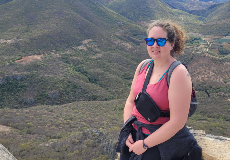"I imagine a day when we all work together to improve the lives of all persons affected by cancer"
Kirsten Efremov's cancer journey has been long and winding, but despite all the hardships she's endured, one thing is certain: she hasn't given up hope that one day, the process of detecting, diagnosing and treating cancers will be better.

My cancer journey started in 1998 when I was 10 years old and diagnosed with acute lymphoblastic leukemia. I went through three years of intense chemotherapy and was put into remission. In 2002, at the age of 14, I experienced a relapse which required another three years of chemotherapy and eight days of cranial radiation. These two diagnoses significantly altered the course of my life, with the extent of their impact yet to be fully determined.
I thought my journey was over, but cancer had other plans for me. In 2016, I received another diagnosis: squamous cell carcinoma, oral cancer. I was 29 and had no risk factors or indications for a secondary cancer. I underwent surgery as my main treatment. I was very fortunate the cancer had not spread to the lymph nodes and I did not require radiation therapy. Reflecting back on those moments during diagnosis, genomic testing was never offered. In hindsight, I wish I had known to ask questions about precision medicine and genomic testing. As much as cancer was familiar to me, it was a new experience in a different clinic with very different supports.
At the time of my childhood cancer diagnoses, genomic testing wasn’t offered either, most likely because it didn’t exist at the time of my diagnosis. It was more cytogenetic testing and looking at changes in genes and chromosomes that might have impacted parts of my treatment which included TPMT Genotyping, HLADR, CD Markers, bone marrow cytogenetics, and testing for the Philadelphia chromosome. However, that was over 20 years ago and things have greatly changed.
Having had three cancer diagnoses, I have been questioning my options for genetic testing for cancer predisposition syndromes (e.g.: Li–Fraumeni syndrome Disorder). Right now, the answer to that question is no, I do not qualify for these specific tests based on the types of cancer I have had and familial history. This is a hard truth for me to face as I do often worry that my cancer will come back again and I don’t know if genetic testing will help ease or confirm that fear.
Today, there are many challenges to accessing precision medicine in Canada, including socioeconomic factors like where you live and your education and employment status. If you are treated in a community hospital, you will not necessarily have access to state-of-the-art precision medicine the same way you would be if you went to a major cancer centre—and not everyone can access a major cancer centre. Those living in rural and remote communities often have to travel great distances and hours just to get to a community hospital, where sequencing and advanced treatments may not available. In addition to this, being able to take time off work to join clinical trials offering precision medicine treatments is a privilege that not everyone can have.
These very real limitations are just some of the things that the Marathon of Hope Cancer Centre Network is trying to address. This amazing Canada-wide collaboration is trying to improve the lives of Canadians living with and affected by cancer by creating a framework to “deliver personalized treatments and therapies; the best treatment at the right time for the right person in the most efficient and cost-effective way” and carry on Terry’s mission.
Of course, there’s still a lot of work to do for this to happen and for now I wait and see. Will I get cancer again is unknown and I need to be mindful of the possible long-term effects from my treatment as a child as well. I don’t check the boxes for any genetic testing and my tumour never had genomic testing. The work the MOHCCN is doing gives me hope that one day precision medicine will be able to help reduce or even eliminate those worries for myself and for others.
I have hope that in the future anyone who experiences cancer will have an opportunity for genomic and/or genetic testing to improve not only their outcomes but also the outcomes of their direct relatives. I am hopeful that precision medicine will not only be able to target the molecular and genomic part of all cancers but also the whole person and be a structured part of person-centred care including the socioeconomic and psychosocial factors that can be impacted by a genomic and genetic test.
I imagine a day when healthcare providers, researchers, persons with lived experience and government come together, work together, to improve the lives of all persons who are affected by cancer regardless of their age, location or type of cancer, rare or common.
"These very real limitations are just some of the things that the Marathon of Hope Cancer Centre Network is trying to address."
